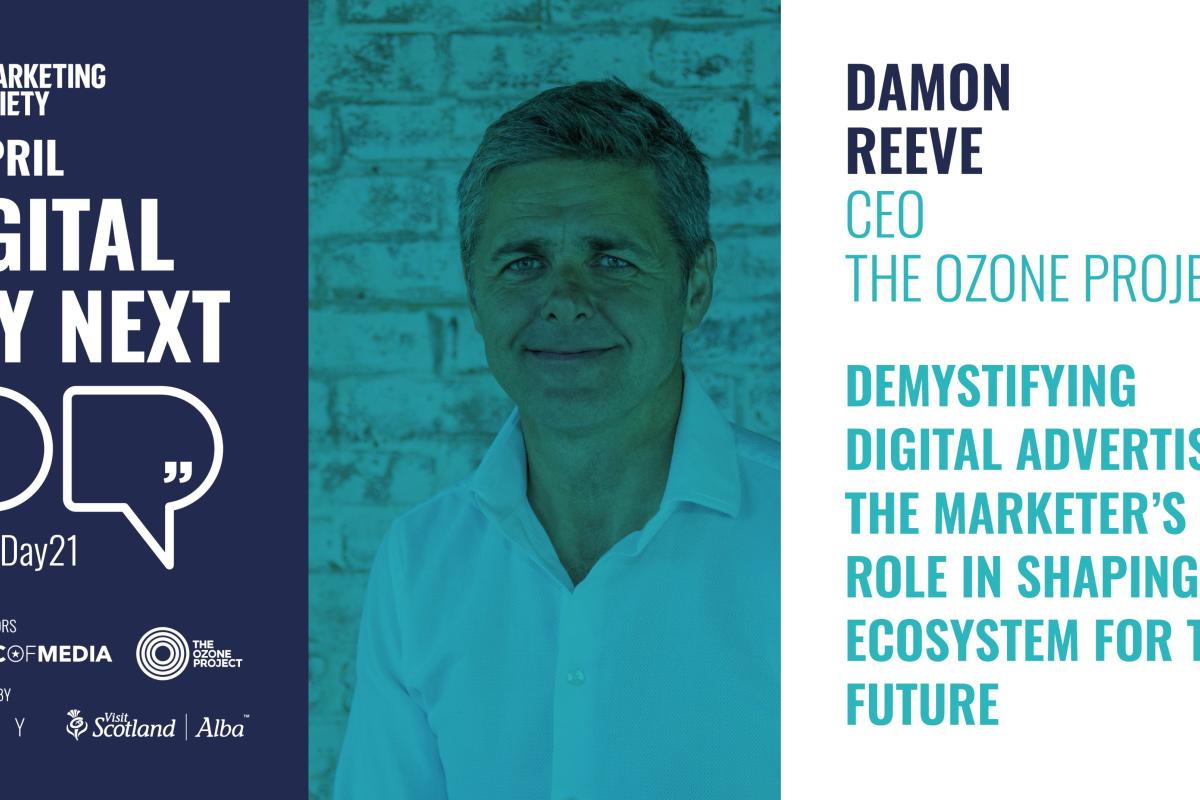At our recent Digital Day, our CEO Sophie spoke with Damon Reeve, CEO of The Ozone Project, about the changing world of digital advertising and what it really means for marketers.
The session was billed as an opportunity to demystify much of the narrative that surrounds this industry, which in the past year alone has seen headlines dominated by issues surrounding third-party cookies, transparency and privacy - and that’s all before we even get started with the global pandemic.
The overarching theme in digital at the moment is unquestionably one of change. And while industry headlines give us a view of some of the challenges facing the sector, few allude to the opportunity this change offers marketers - the opportunity to sustainably reshape the online advertising ecosystem in a way that delivers even greater value for brands.
In addition to Sophie’s full conversation with Damon available to view below, we posed three questions to Damon to neatly sum-up this session, focusing on the seismic changes occurring and what it means for us as marketers.
Damon, can you briefly sum up what is changing in the world of digital advertising?
One of the most talked about topics in digital advertising in the past year has been ‘the death of the third-party cookie’. The reason why these headlines have been so dominant is because third-party cookies impact the way we currently do many things in digital advertising, and in particular programmatic advertising. From audience segmentation to targeting, frequency capping to campaign measurement, the third-party cookie has been a fuel for advertising campaigns and the growth of the industry at large.
It was when Google announced that they would no longer support third-party cookies in Chrome - the browser of choice for the majority of the population - that the industry began to acknowledge that the way things were done previously will not be the same as any future state.
Change is now inevitable - and when combined with the major issues of transparency highlighted by ISBA and PwC’s report into the programmatic supply chain or the ongoing focus of regulators like the ICO on protecting consumer privacy - it’s become even clearer that this change shouldn’t simply be a rehash of the status quo. And while the need to do things differently has been bubbling away for some time, the arrival of a global pandemic brought this change to the boil with even greater scrutiny placed on advertising investment and effectiveness.
So why is this important to marketers? Is it really our issue to deal with?
Marketers are, by definition, one of the gatekeepers and curators of consumer relationships, and changes to the digital ecosystem should first and foremost help to address many of the negative perceptions and mistrust the public has around digital advertising; largely fuelled by data misuse, ad bombardment and creepy, stalker-like ads following them around the internet. The consumer-centric nature of this change means that marketers can’t help but be involved.
Somewhat ironically, the reason why Google’s decision to stop supporting third-party cookies has been positioned as such a problem is because Chrome was the last safe-haven for this type of negatively-perceived digital advertising - after all, Safari and Firefox had made these same user-friendly changes years ago. In addition, for all the great things our current programmatic system offers - scale of specific audiences on different devices, in different mindsets, in different contexts - it has also created major challenges for both advertisers and content publishers. Whether these issues relate to brand safety, platform dominance or budgetary transparency, the current set-up has raised many questions about what is truly valued in programmatic advertising and where that value is created.
While we know digital advertising works, imagine how powerful it would be if we created the best possible advertising experiences for consumers. That’s where you, the marketer, can truly influence the future - as this storm of change is followed by the dawning of an opportunity to create a brighter future for digital advertising.
At Ozone we believe we can make digital advertising work better for both brands and quality content creators like our publishers, in a way that rewards the relationships each creates with consumers that ultimately make advertising possible.
So if I believe all this is important, how can I help drive change?
If you’ve read this far into this article it’s probably because you care about your craft, you care about your customers and you care about doing things better. As a marketing practitioner driving change will mean thinking about the future you want to be part of.
Do you want to be part of a future where your consumers’ data is shared among often anonymous tech companies, where easily gamified ad tech metrics are your measures of success, and where any engagement with consumers is deemed as good engagement? Or do you want to be part of a future where your customers’ data is treated properly and respectfully, where you do things because it’s right to not just because you can, and where your advertising succeeds because your target audience is genuinely interested in what you have to offer?
If you, like me, are in the latter camp then I want to leave you with five actionable takeaways I would recommend you start thinking about or doing as soon as you can:
1. DON’T BE AFRAID TO ENGAGE:
The world of programmatic and digital advertising is complex, some would even argue deliberately so by design, but never be afraid to ask questions. The old adage rings true - the only dumb question is the one that’s never asked.
2. AIM FOR THE LONG-TERM:
Quick wins have fuelled much of the digital advertising that we know today, yet few businesses operate with such a short-term mindset. Make sure you have long-term goals to work towards that go beyond your quarterly campaign targets.
3. DEFINE YOUR SUCCESS MEASURES:
Really interrogate your marketing KPIs to understand whether they sync with your business-wide measures of success. Think about aligning measures across media, rather than isolating digital advertising and relying on adtech metrics like CTR and vCPM.
4. ALIGN YOUR PARTNERS:
It’s much easier to embrace change if everyone is moving in the same direction. A big factor in creating this alignment is understanding how each of your partners are incentivised - your success measures should be the key driver of your partners’ success.
5. KNOW WHERE YOUR BUDGETS ARE SPENT:
Marketers have long been interested in the deployment of their media - be it a specific TV spot or a hand-picked poster site - a specificity that is less likely in digital advertising. It’s important to remember that not every ad impression is consumed equally or delivers results equally - like any other channel, quality digital environments will always deliver more.



